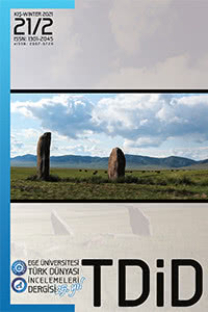Deli Dumrul Anlatmasında Ötenazi Kalıntısı
Bugüne kadar Deli Dumrul anlatması pek çok yönden incelenmiş ve anlatmada yer alan eski Türk yaşamına ilişkin pek çok özellik ele alınmıştır. Bu anlatmada genel olarak değinilen bir başka özellik ise bir tür can pazarlığıdır. Canı yerine can bulmak zorunda kalan Deli Dumrul neden ilk önce babasından can ister? Oysa olay örgüsünü bilmeyen herhangi bir okuyucu, kahramanın ilk önce annesinden can isteyeceğini düşünebilir. Anlatıda ilk planda babanın yer alması eski toplumsal yapıda erkeğin yaşlanarak, bir kadın gibi ölmeme isteğinin yansıması olmalıdır. Kahraman bu nedenle ilk olarak babasından, daha sonra da annesinden canı yerine can istemektedir. Her iki birey de çağlarını yaşamış, artık hayatlarının sonuna gelmiş, eski güç ve toplumsal yapıdaki konumlarını kaybetmişlerdir. Bu nedenle onların can vermesi en doğal süreç, bir tür “gönüllü ölüm”, literatürdeki adıyla “ötenazi” olarak adlandırılabilir. Bildiride zor koşullara daha çok maruz kalmış toplumlarda yaşlanmış baba ve anneyi öldürme veya ölüme terketme geleneğine değinilecek ve Deli Dumrul anlatmasında bu geleneğin kalıntısının yer almış olabileceği ortaya konulmaya çalışılacaktır
Anahtar Kelimeler:
Ötenazi, can, Deli Dumrul, kalınt
Traces of Euthanasia in the Narrative of Deli Dumrul
Narrative of Deli Dumrul has been analyzed in many aspects till today and variety of properties about the old time life style of Turks has been discussed. Another property mentioned in this narrative is a kind of bargain for life. Why has Deli Dumrul turned to his father at first, when he has had to find another life instead of his? Any reader, who doesn’t know about the plot, could be thought that the hero would ask to his mother first. The situation of the father adopted in the narrative has to be the reflection of the men’s wish, which was not to die as a result of ageing like a woman in the old social structure. That’s why the hero asked for life instead of his life firstly to his father and then to his mother. Both of the two have lived through their era, came to the end of their lives and lost their power and situations in the old social structure. Thus their death could be named as a kind of “voluntary death” or “euthanasia” as called in literature. Tradition of leaving old-aged father and mother to death or killing them in the societies exposed to difficult life conditions will be mentioned in the paper and it is tried to be proved that traces of this tradition could be taken places in the narrative of Deli Dumru
Keywords:
Euthanasia, life, Deli Dumrul, traces,
- ISSN: 1301-2045
- Başlangıç: 1996
- Yayıncı: Ege Üniversitesi Türk Dünyası Araştırmaları Enstitüsü
Sayıdaki Diğer Makaleler
Basat’ın Tepegöz’ü Öldürdüğü Destan’ın Yeni Bir Yorumu Üzerine
Dede Korkut’ta Yer Alan Atasözlerinde Metaforların İşleyişi
Deli Dumrul Anlatmasında Ötenazi Kalıntısı
Dede Korkut Anlatmalarından Hareketle Ağıt Türü Üzerine Bir Değerlendirme
Araş. Gör. Dr. Gonca KUZAY DEMİR
Heinrich Friedrich von Diez’in Tepegöz Tercümesinde Yaptığı Yanlışlar
1922--1927'de "Kitab--ı Dede Korkut" Hakkında Yapılmış Bir Araştırmanın Yayımlanmamasının Nedenleri
1922-1927’de “Kitab-ı Dede Korkut” Hakkında Yapılmış Bir Araştırmanın Yayımlanmamasının Nedenleri
